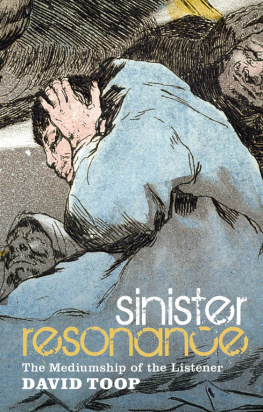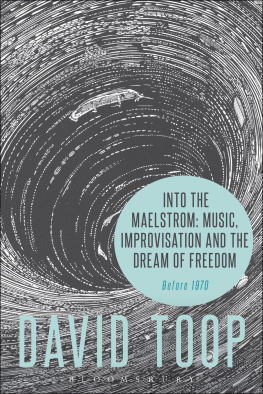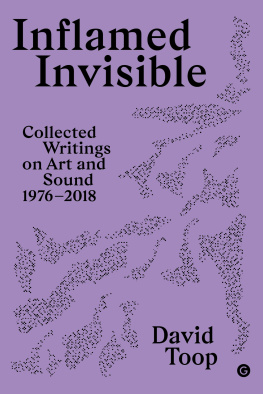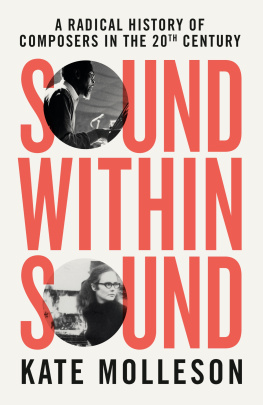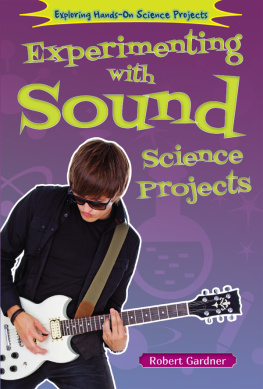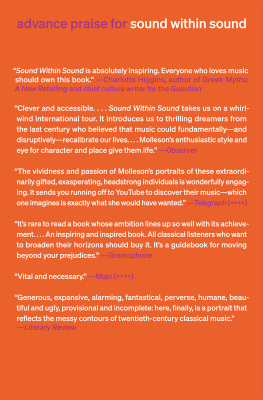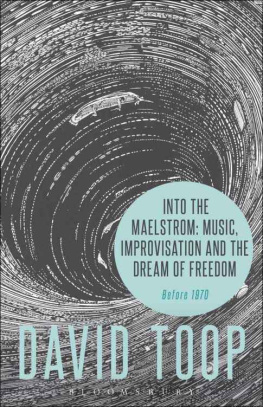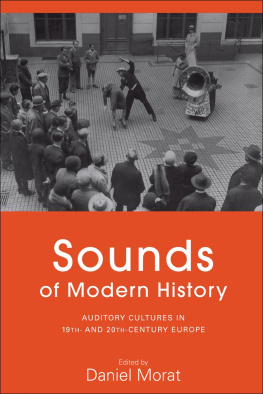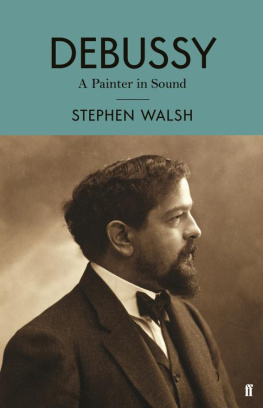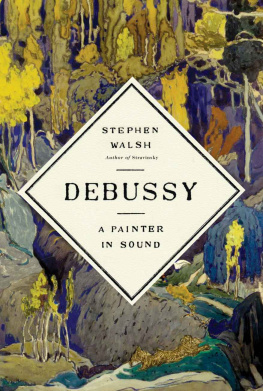DAVID TOOP is a musician, writer and sound curator based in London. The author of seven books on music, sound and listening, he is currently Professor of Audio Culture and Improvisation at London College of Communication.
Praise forOcean of Sound
As styles of music multiply and divide at an accelerating pace, Ocean of Sound challenges the way we hear, and more importantly, how we interpret what we hear around us. Daily Telegraph
Ocean of Sound shatters consensual reality with a cumulative force thats both frightening and compelling. Buy it, read it and let it remix your head. i-D
Its parallels arent music books at all, but rather Italo Calvinos Invisible Cities, Michel Leiriss Afrique Phantme, William Gibsons Neuromancer David Toop is our Calvino and our Leiris, our Gibson. Ocean of Sound is as alien as the twentieth century, as utterly Now as the twenty-first. An essential mix. The Wire
An extraordinary and revelatory book, Ocean of Sound reads like an alternative history of twentieth-century music, tracking the passage of organised sound into strange and new environments of vapour and abstraction. Tony Herrington
At the end of the millennium, we can see two trends in music, one proactive, the other reactive Toops Ocean of Sound brilliantly elaborates both these processes, like sonic fact for our sci-fi present, a Martian Chronicle from this Planet Earth. The Face
This Encyclopaedia of Heavenly Music is an heroic endeavour brought off with elegance and charm. The play of ideas is downright musical and, vitally, the author writes like a mad enthusiast rather than a snob. NME
Always the rigorous pluralist, [Toop] sees no reason not to expect wisdoms from rival cultures, tribal or club, nor emptiness or stupidity either. His sense of the absurd, of potential darkness and madness, is a bullshit detector never turned off. New Statesman & Society
ALSO BY DAVID TOOP AND PUBLISHED BY SERPENTS TAIL
Exotica: Fabricated Soundscapes in a Real World Rap Attack #3
Ocean of Sound
Ambient sound and radical listening in the age of communication
DAVID TOOP

This edition published in 2018
First published in 1995 by Serpents Tail
an imprint of Profile Books Ltd
3 Holford Yard
Bevin Way
London
WC1X 9HD
www.serpentstail.com
Copyright David Toop, 1995
Foreword copyright Michel Faber, 2018
The moral right of the author has been asserted.
All rights reserved. Without limiting the rights under copyright reserved above, no part of this publication may be reproduced, stored or introduced into a retrieval system, or transmitted, in any form or by any means (electronic, mechanical, photocopying, recording or otherwise), without the prior written permission of both the copyright owner and the publisher of this book.
A CIP catalogue record for this book is available from the British Library.
eISBN 978 1 78816 104 6
for Leslie John Toop (191395)
and for
Kimberley (195995)
in a green sunny place
contents
authors note to the new edition
Ocean of Sound was a case of finding the propitious moment and the right vessel for ideas that I had been developing since the late 1960s. I think of it now as a Trojan Horse, early-90s ambient music serving as a device to disguise a far more expansive narrative about twentieth-century experimental music of all persuasions. In truth, it was far less calculating than that. The book was written feverishly over a period of three or four months during a time of difficult personal circumstances. Perhaps this was one reason a strange one why it feels relatively optimistic. I was inspired by all the innovative new music emerging in the early 1990s, when previously tight divisions between genres seemed to be breaking down. There was a palpable feeling of social and cultural experiment in the air that connected right back to the late nineteenth century, allowing me to make connections between contemporary electronic tracks, the ambient scene and all their avant-garde antecedents. This showed me a way back into my own music making after years of working almost full time as a music critic but I also used it to counterbalance the problems of my own life.
Immediately after I delivered the manuscript these problems became dramatically worse and so I found myself in the curious position of struggling for emotional survival at exactly the moment when all my ideas of the past twenty-five years came to fruition. The book was surprisingly well received and even now I meet many people who tell me it changed their lives. This is gratifying, of course, but being hypercritical of my own work and something of a sceptic it makes me inclined to go back to the book to find out whats wrong with it. One aspect that strikes me is the utopian view of what were then, in 1995, very new developments: the emergence of the internet and all its implications for globalisation, communications and the spread of culture. It was obvious that the effect on music production and distribution would be traumatic but with hindsight my failure to foresee a much darker future for the web dominated by corporate interests and overrun with hate speech, extreme pornography and trivia, along with its decimation of existing media was a serious error.
The title itself Ocean of Sound was also criticised for a certain New Age tinge. I feel less bothered by this. My original title was Aether Talk (also a reference to the rise of the World Wide Web) but as Serpents Tail founder Pete Ayrton pointed out, people might not be able to spell it, let alone understand what I meant by it. I came to my senses and thought up a title that was more likely to get the book into bookshops. The question in my mind is this: was the ocean of sound an adequate metaphor to encapsulate my conception of music? What interests me is the web of relations, those labyrinthine connections that link the most unlikely subjects, regardless of genre, era, geography, social class, race, language, age, sexual preference and all the other cultural and demographic factors used to divide music (often for commercial reasons) into neat categories.
Maybe plant and animal ecologies are a better way of expressing this, I dont know, but oceanic associations of wave forms, fluidity, transparency, depth and vastness allowed me to write about music in a different way. What I do know is that from childhood I was attracted to music, sound and acts of listening for their intrinsic qualities, rather than because they affirmed an identity or addressed themselves to a particular demographic. In the early 1980s I co-edited a magazine called Collusion. Our policy was to cover any music that interested us, regardless of whether it was hip, new or relevant. A few years later I was writing a monthly music column for The Face magazine, acutely aware that I could use my thousand words to play with and even undermine the magazines fascination for fashion tribes and their musical tastes. Ocean of Sound built on these foundations but it took me a long time until my mid-forties to find a form that articulated this free-ranging approach over the length of a book. The writing of Ocean of Sound was inspired by the cut-and-paste possibilities of computer word processing, by speculations on hypertext and hyperlinks and by the experimental writers who had influenced me in my teens. In struggling to find this form I realised that I could dispense with linearity, instead building a story from short blocks of text that connected with bigger themes. It was a kind of free improvisation, a music I had been involved in since the 1960s, but it also mirrored the computer-programmed music I was making at the time and the hip-hop sampling I had written about in
Next page

